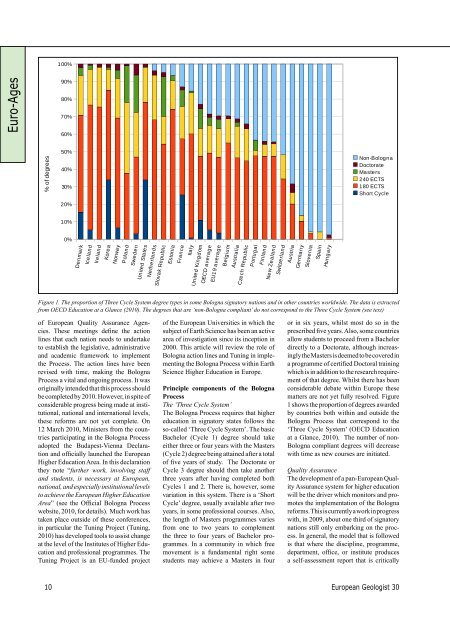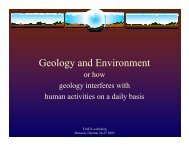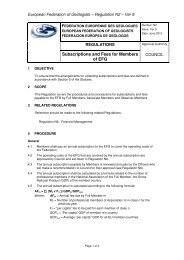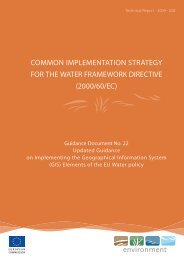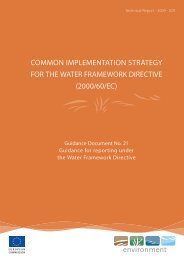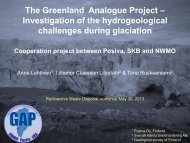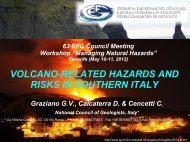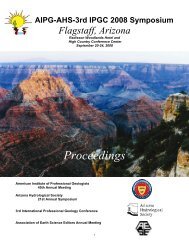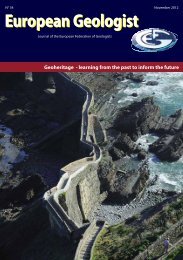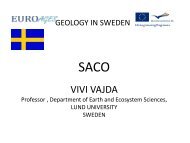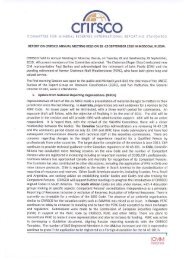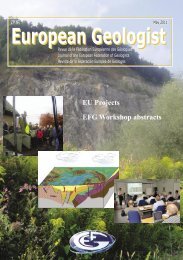100%Euro-Ages90%80%70%60%% <strong>of</strong> degrees50%40%<strong>30</strong>%20%Non-BolognaDoctorateMasters240 ECTS180 ECTSShort Cycle10%0%DenmarkIcelandIrelandKoreaNorwayPolandSwedenUnited StatesNetherlandsSlovak RepublicEstoniaFranceItalyUnited KingdomOECD averageEU19 averageBelgiumAustraliaCzech RepublicPortugalFinlandNew ZealandSwitzerlandAustriaGermanySloveniaSpainHungaryFigure 1. The proportion <strong>of</strong> Three Cycle System degree types in some Bologna signatory nations and in other countries worldwide. The data is extractedfrom OECD Education at a Glance (2010). The degrees that are ‘non-Bologna compliant’ do not correspond to the Three Cycle System (see text)<strong>of</strong> <strong>European</strong> Quality Assurance Agencies.These meetings define the actionlines that each nation needs to undertaketo establish the legislative, administrativeand academic framework to implementthe Process. The action lines have beenrevised with time, making the BolognaProcess a vital and ongoing process. It wasoriginally intended that this process shouldbe completed by 2010. However, in spite <strong>of</strong>considerable progress being made at institutional,national and international levels,these reforms are not yet complete. On12 March 2010, Ministers from the countriesparticipating in the Bologna Processadopted the Budapest-Vienna Declarationand <strong>of</strong>ficially launched the <strong>European</strong>Higher Education Area. In this declarationthey note “further work, involving staffand students, is necessary at <strong>European</strong>,national, and especially institutional levelsto achieve the <strong>European</strong> Higher EducationArea” (see the Official Bologna Processwebsite, 2010, for details). Much work hastaken place outside <strong>of</strong> these conferences,in particular the Tuning Project (Tuning,2010) has developed tools to assist changeat the level <strong>of</strong> the Institutes <strong>of</strong> Higher Educationand pr<strong>of</strong>essional programmes. TheTuning Project is an EU-funded project<strong>of</strong> the <strong>European</strong> Universities in which thesubject <strong>of</strong> Earth Science has been an activearea <strong>of</strong> investigation since its inception in2000. This article will review the role <strong>of</strong>Bologna action lines and Tuning in implementingthe Bologna Process within EarthScience Higher Education in Europe.Principle components <strong>of</strong> the BolognaProcessThe ‘Three Cycle System’The Bologna Process requires that highereducation in signatory states follows theso-called ‘Three Cycle System’. The basicBachelor (Cycle 1) degree should takeeither three or four years with the Masters(Cycle 2) degree being attained after a total<strong>of</strong> five years <strong>of</strong> study. The Doctorate orCycle 3 degree should then take anotherthree years after having completed bothCycles 1 and 2. There is, however, somevariation in this system. There is a ‘ShortCycle’ degree, usually available after twoyears, in some pr<strong>of</strong>essional courses. Also,the length <strong>of</strong> Masters programmes variesfrom one to two years to complementthe three to four years <strong>of</strong> Bachelor programmes.In a community in which freemovement is a fundamental right somestudents may achieve a Masters in fouror in six years, whilst most do so in theprescribed five years. Also, some countriesallow students to proceed from a Bachelordirectly to a Doctorate, although increasinglythe Masters is deemed to be covered ina programme <strong>of</strong> certified Doctoral trainingwhich is in addition to the research requirement<strong>of</strong> that degree. Whilst there has beenconsiderable debate within Europe thesematters are not yet fully resolved. Figure1 shows the proportion <strong>of</strong> degrees awardedby countries both within and outside theBologna Process that correspond to the‘Three Cycle System’ (OECD Educationat a Glance, 2010). The number <strong>of</strong> non-Bologna compliant degrees will decreasewith time as new courses are initiated.Quality AssuranceThe development <strong>of</strong> a pan-<strong>European</strong> QualityAssurance system for higher educationwill be the driver which monitors and promotesthe implementation <strong>of</strong> the Bolognareforms. This is currently a work in progresswith, in 2009, about one third <strong>of</strong> signatorynations still only embarking on the process.In general, the model that is followedis that where the discipline, programme,department, <strong>of</strong>fice, or institute producesa self-assessment report that is critically10 <strong>European</strong> Geologist <strong>30</strong>
evaluated with feedback. The evaluationprocess also involves a site visit. Thisprocess must involve students and shouldbe externally, preferably internationally,validated. A set <strong>of</strong> guidelines have beenpublished by the <strong>European</strong> Associationfor Quality Assurance in Higher Education(ENQA, 2009) whose purpose is toestablish <strong>European</strong> standards for internaland external quality assurance, externalquality assurance agencies and a <strong>European</strong>register <strong>of</strong> quality assurance agencies. Thequality <strong>of</strong> degree programmes in all signatorystates will, therefore, follow similar,regular, validated assessments, effectivelyremoving the argument that degrees in onestate are <strong>of</strong> a different quality from thosein another.Recognition <strong>of</strong> Degrees and DiplomasThe main international legal text that aimsto further the fair recognition <strong>of</strong> qualificationsis the Council <strong>of</strong> Europe/UNESCOConvention on the Recognition <strong>of</strong> Qualificationsconcerning Higher Education inthe <strong>European</strong> Region (Lisbon RecognitionConvention, see Council <strong>of</strong> Europe,2010). The recognition <strong>of</strong> qualifications isthe responsibility <strong>of</strong> each country, meaningthat higher education institutions areresponsible for the recognition <strong>of</strong> qualificationsfor the purpose <strong>of</strong> further studywhereas pr<strong>of</strong>essional bodies or employersare responsible for recognition for the purposes<strong>of</strong> the labour market. There are manyaspects to the recognition <strong>of</strong> higher educationalqualifications throughout Europe;however, the <strong>European</strong> Credit Transfer andAccumulation System, the Diploma Supplementand Qualification Frameworks areessential requirements for this to happen.The <strong>European</strong> Credit Transfer and AccumulationSystemThe <strong>European</strong> Credit Transfer and AccumulationSystem (ECTS) is the fundamentaltool that allows comparison <strong>of</strong> coursesand degrees across Europe. ECTS grewout <strong>of</strong> the need for transportable certificationfor students who took part <strong>of</strong> theircourse work abroad under such schemesas Erasmus Mundus. However, this systemmust now be applied to all courses andprogrammes and a comprehensive set <strong>of</strong>guidelines for the correct implementation<strong>of</strong> ECTS has recently been published(<strong>European</strong> Commission, 2009). A year <strong>of</strong>study, which comprises about 1500 hours<strong>of</strong> total student commitment (not to beconfused with formal timetabled contacthours), permits the award <strong>of</strong> 60 ECTScredits on satisfactory completion, that iswhen the student passes all the assessmentsfor that year. A Bachelor degree,therefore, requires a minimum <strong>of</strong> 180 anda maximum <strong>of</strong> 240 ECTS credits. It shouldalso be noted that these credits must becumulative, in other words the studentneeds to acquire them at the level <strong>of</strong> eachyear <strong>of</strong> study. Some ECTS credits can beacquired at a lower level, but this limitedfacility exists only to allow students totake other ‘minor’ subjects. The <strong>European</strong>Commission may award an ECTS Label toan institution <strong>of</strong> higher education that ‘hasshown excellence in applying the <strong>European</strong>Credit Transfer and Accumulation System(ECTS) and the Diploma Supplement (DS)’(see below). At the time <strong>of</strong> writing only 65IHEs (approximately 1% <strong>of</strong> the total) havebeen awarded such Labels, but this numberis bound to grow especially as it will give acompetitive advantage to those IHEs whopossess such Labels in terms <strong>of</strong> attractinginternational students.Diploma SupplementThe Diploma Supplement is the instrumentwhereby an institution <strong>of</strong> higher educationgives a full and transportable account <strong>of</strong> astudent’s achievements. It accompanies alocally awarded higher education diplomaand provides a standardized description <strong>of</strong>the nature, level, context, content and status<strong>of</strong> the studies completed by its holder. Thisproduct should not only make it easier forstudents to study abroad, but also shouldassist with pr<strong>of</strong>essional mobility. IHEs canbe awarded a Diploma Supplement Labelin addition to the ECTS label.National and <strong>European</strong> QualificationFrameworksThese Frameworks (NQF/EQF) describethe qualifications <strong>of</strong> an education systemand how they interlink. National qualificationsframeworks describe what learnersshould know, understand and be able to doon the basis <strong>of</strong> a given qualification as wellas how learners can move from one qualificationto another within a system. Theyapply to all levels <strong>of</strong> educational attainmentcovering school, workplace training, andhigher education. The <strong>European</strong> QualificationsFramework (<strong>European</strong> Commission,2008) provides a meta framework throughwhich individual NQFs can be compared.The NQFs take priority and may differin detail from the EQF, but must have anagreed mapping onto the EQF. The aim isto provide both individuals and employerswith a tool to compare the qualificationslevels <strong>of</strong> different countries, differenteducation and different training systems.Few countries yet have fully implementedexternally validated NQFs and about onethird <strong>of</strong> signatory states are only embarkingon the process. An example <strong>of</strong> themapping between an NQF and the EQF isprovided in Ireland where Cycle 1 degreescan be either <strong>of</strong> 180 ECTS credits (Level 7or ‘Ordinary Bachelors Degrees’) or 240ECTS credits (Level 8 or ‘Honours BachelorsDegrees’ or ‘Higher Diplomas’) inthe NQF (see www.nqf.ie) which map toLevel 6 (Bachelors Degrees) <strong>of</strong> the EQF.MobilityThe Ministers responsible for HigherEducation in the countries participatingin the Bologna Process in the communiquefollowing the London Conference inMay 2007 issued the following statement.“Mobility <strong>of</strong> staff, students and graduatesis one <strong>of</strong> the core elements <strong>of</strong> theBologna Process, creating opportunitiesfor personal growth, developing internationalcooperation between individualsand institutions, enhancing the quality <strong>of</strong>higher education and research, and givingsubstance to the <strong>European</strong> dimension”.Workplace and societyIn the Leuven Communiqué <strong>of</strong> 2009 theMinisters identified a list <strong>of</strong> priorities forthe coming decade, which included: thesocial dimension <strong>of</strong> higher education;lifelong learning; employability. A recentEurobarometer Survey, FLASH 260,(<strong>European</strong> Commission, 2009b) amongstudents in higher education reported thatthe vast majority <strong>of</strong> students want: wideraccess to higher education; universitiesto further develop cooperation with theworld <strong>of</strong> work; wider access to lifelonglearning. In particular: 97% wanted theknowledge and skills they needed to besuccessful in the labour market, 91% recognizedthe need for personal development;87% supported the principal thateducation should facilitate people to playan active role in society; a similar proportionagreed that higher education should“foster innovation and an entrepreneurialmindset among students and staff, and thatthere should be a possibility to undertakework placements in private enterprises aspart <strong>of</strong> a study programme” (<strong>European</strong>Commission, 2009b). The Bologna Processshould provide a platform for bettercooperation between IHEs, industry andsociety. Something that may prove crucialif the geoscience pr<strong>of</strong>ession is going tomeet the challenges <strong>of</strong> the future.The recognition <strong>of</strong> prior learning (RPL)and lifelong learning (LLL) are also essentialEuro-Ages<strong>European</strong> Geologist <strong>30</strong>11


